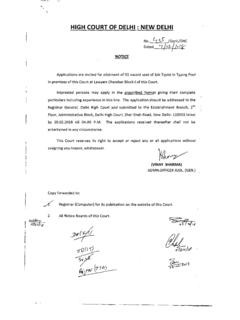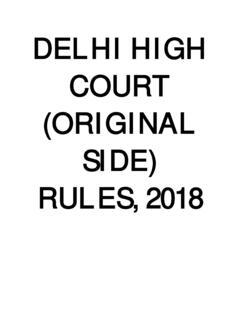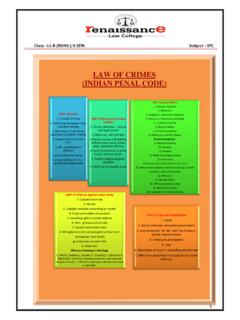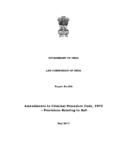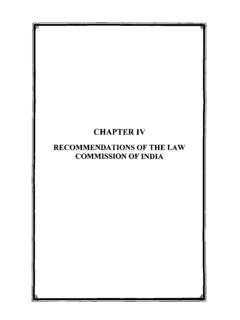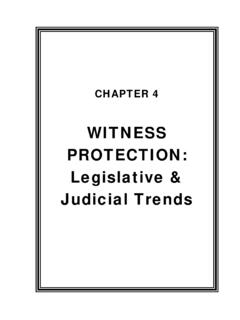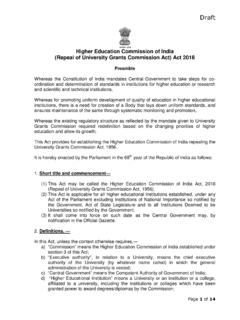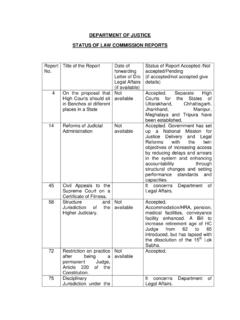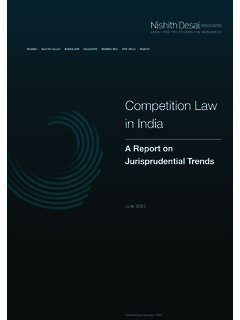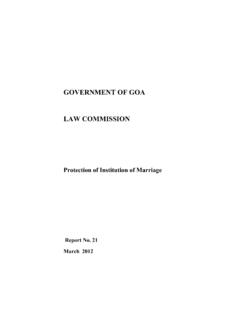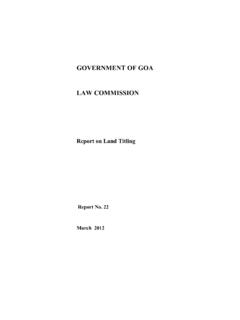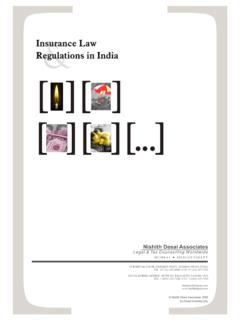Transcription of LAW COMMISSION OF INDIA - Delhi High Court
1 LAW COMMISSION OF INDIA198TH REPORTONWITNESS IDENTITY PROTECTIONANDWITNESS PROTECTION PROGRAMMESAUGUST 2006 JUSTICE M. JAGANNADHA RAO LAW COMMISSION OF INDIACHAIRMAN SHASTRI BHAWANNEW Delhi -110001 TEL: 23384475 FAX: (011) 23073864, 23388870E-MAIL: 1, JANPATHNEW Delhi -110011 TEL: 23019465F. (3) 99-2004LC(LS) 31st August 2006 Dear Sh. Bhardwaj Ji,Sub:198th Report of the Law COMMISSION on Witness IdentityProtection and Witness Protection Programme .The Supreme Court of INDIA has recently referred to the questions of Witness Identity Protection and Witness Protection Programmes in anumber of judgments: NHRC v. State of Gujarat: 2003 (9) SCALE 329,PUCL v. Union of INDIA : 2003(10) SCALE 967, Zahira v. State of Gujarat:2004(4) SCC 158, Sakshi of INDIA :2004 (6) SCALE 15 and Zahira 2006 (3) SCALE 104. In Sakshi the Court emphasized the needfor legislation on witness protection.
2 In view of these observations, the LawCommission has taken up the subject suo motu. In this Report it has confinedthe Witness Identity Protection procedures to cases triable by the Court ofSession of Courts of equal Identity Protection may require during investigation, inquiryand trial while Witness Protection Programmes apply to the physicalprotection of the witness outside the is accepted today that Witness Identity Protection is necessary in thecase of all serious offences wherein there is danger to witnesses and it is notconfined to cases of terrorism or sexual , the Law COMMISSION prepared a Consultation Paper on Witness Identity Protection and Witness Protection Progammes (August2004) and invited responses to the Consultation Paper contained three parts: Part I General(Chapter 1 to IV), Part II Witness Identity Protection v. Rights of accused(Chapters V, VI) and Part III Witness Protection Programmes (Chapter VII).
3 2 The Statutes of New Zealand and Portugal were annexed as examples ofexisting attached of Consultation Paper and Responses:The Questionnaire attached to the Consultation Paper, 2004 containedtwo Parts A and B, the former dealing with Witness Identity Protection andthe latter dealing with Witness Protection COMMISSION held two seminars, one in New Delhi on 9th October,2004 and another at Hyderabad on 22nd January, 2005 where a number ofJudge of the High Court , lawyers, police officers, public prosecutors,judicial officers (Magistrates and Sessions Judges) participated. So far as written responses are concerned, a large number of responses, about 50, were received from State Governments, DirectorsGeneral of Police/Inspectors General of Police, High Court Judges,international and local organizations, Judges of the subordinate judiciary,jurists, advocates and public prosecutors.
4 These were Report:In this Final Report, the COMMISSION has discussed the responses andgiven its recommendations, both in regard to Witness Identity Protection andWitness Protection Programmes. So far as the Witness Identity Protection isconcerned, it has also annexed a Draft Bill as Annexure I. The Commissionhas not given any Draft Bill in regard to Witness Protection Programmes. TheConsultation Paper (August 2004) is annexed as Annexure Identity Protection: We shall briefly refer to our approach on Witness Identity Protection inPart I of the Final accused in our country have a right to an open public trial in acriminal Court and also a right to examination of witnesses in open Court intheir presence. But, these rights of the accused are not absolute and may berestricted to a reasonable extent in the interests of fair administration ofjustice and for ensuring that victims and witnesses depose without any right of the accused for an open trial in his or her presence, being notabsolute, the law has to balance that right of the accused as against the needfor fair administration of justice in which the victims and witness deposewithout fear or danger to their lives or property or those of their are three categories of witnesses: (i) victim-witnesses who areknown to the accused; (ii) victims-witnesses not known to the accused ( in a case of indiscriminate firing by the accused) and (iii) witnesses whoseidentity is not known to the accused.
5 Category (i) requires protection fromtrauma and categories (ii) and (iii) require protection against disclosure ofidentity. In category (i) above, as the victim is known to the accused, there isno need to protect the identity of the victim but still the victim may desirethat his or her examination in the Court may be allowed to be givenseparately and not in the immediate presence of the accused because if he orshe were to depose in the physical presence of the accused, there can betremendous trauma and it may be difficult for the witness to depose withoutfear or trepidation. But, in categories (ii) and (iii), victims and witnesseswho are not known to the accused have a more serious problem if there islikelihood of danger to their lives or property or to the lives and properties oftheir close relatives, in case their identity kept secret at all stages of a criminalcase, namely, investigation, inquiry and has been debate in several countries as to how the rights of theaccused and the need for witness identity protection can be balanced.
6 Sucha balance has been achieved even in USA and some other countries whereconfrontation of witnesses in open Court is indeed a constitutional or statutoryright. They have devised appropriate procedures that can be prescribed in theinterest of victims and witnesses. For that purpose, in the Consultation Paperas well as in this Report, we have extensively referred to the comparative lawas to how these rights are balanced in other countries. (i)At the stage of investigation: We are of the opinion that witness protection is necessary even at thestage of investigation. This can be provided by the prosecutor moving theMagistrate to a conduct a preliminary inquiry or voir dire,in his chambers, camera. The Magistrate will have to consider the material relied upon bythe prosecutor for substantiating the danger to the witness or his propery orthose of his relatives, and, if necessary, the Magistrate can examine thewitness.
7 The suspect is not entitled to e heard at this stage duringinvestigation. If the Magistrate comes to the conclusion that there islikelihood of danger, he can grant identity will, however, be disclosed to theMagistrate and none else. Further, the real identity will not be reflected in thecourt records but the witness will beis described by a pseudonym or a letterfrom the alphabet. The Magistrate, which passing the order will, however,keep in mind the various matters listed in sec. 5(6) of the Bill. Such ananonymity order passed at the investigation stage will ensure only during the investigation period.(ii)During inquiry and before recording evidence at the trial: In the inquiry before the Magistrate or Court of Session (before thetrial starts), the prosecutor or the witness has to make a fresh application andthis is necessary even if some of the witnesses have been allowed anonymityand given a new identity during investigation.
8 The Magistrate or judge hasto pass a fresh preliminary order granting anonymity. The reason is that,unlike at the stage of investigation, in the case of identity protection duringinquiry/or before trial, such protection can be granted only after giving areasonable opportunity to the accused. We have evolved a procedure inwhich inquiry before the Magistrate or before the Sessions Judge beforerecording of evidence at the trial, the Magistrate or Judge will consider thematerial produced y the prosecutor or the witness as to the danger to his life orproperty or that of his relatives, and will, if necessary, hear the witness. Allthis has to be in camera and the accused/his lawyer will not be , the Magistrate or Judge will have to hear the accused or his lawyerseparately and disclose to them the material relating to the alleged danger tothe witness, but not any facts which may enable the accused or his lawyer todiscover the real identity of the witness.
9 This, we have pointed, satisfies therequirement of law where rights of the accuse and the rights of the witness getbalanced. If, during inquiry, the Magistrate or Judge grants identityprotection by a preliminary order, it will ensure not only for the period duringinquiry, trial, but at the later stages of appeal or revision and even after thecase has been finally concluded. The record of the proceedings shall not,however, contain the real identity of the witness or any facts from whichidentity can be (iii)Recording evidence during the trial in the Sessions Court : two-way closed circuit television :The next stage is the final stage of trial in the Sessions Court . Thewitness, if he had already been granted anonymity by the Magistrate or Judge,as stated above, he need not apply again for respect of the evidence during the trial a two-way closed-circuittelevision or video link and two-way audio link is proposed and these will beinstalled connecting two , after the decision of the Supreme Court in State ofMaharashtra v.
10 Dr. Praful B Desai, 2003 (4) SCC 601 and Sakshi, 2004 (6)SCALE 15, such evidence by video-link is trial in Supreme Court will be conducted under a very detailedprocedure which we have prescribed in Chapters IX and X and in sec. 12, 13and Schedules 1 and II of the Bill annexed to the Report. The procedure, asstated above, requires the use of a two-way closed-circuit television or video-link and two way audio system. But then there are two separate procedures,(a) Chapter IX and sec 12, Schedule 1 cover cases of victims/witnesses notknown to accused who require identity protection and (b) Chapter X and sec13, Schedule II to victims known to the accused and who are to be protectedfrom trauma.(a)So far as the victims and witnesses not known to the accused, whoseidentity has to be protected, the procedure in sec. 12 read with Schedule 1 isas follows:In one room, (which we may call) (A), the Presiding Judge, the Court -master, the stenographer, the public prosecutor, the threatened witness and thetechnical personnel (who will be employees of the Court ) will be another room, which we may call (B), the accused, his pleader andthe technical persons operating the system will alone be present.



